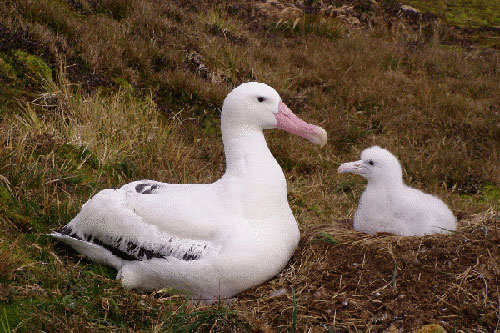Monitoring of the amounts of fishing gear found in association with albatrosses at a colony in the south-west Atlantic Ocean over a 16-year period has revealed that of the ACAP-listed species of albatrosses and giant petrels studied, the Wandering Albatross Diomedea exulans is the most affected.
The study, published on-line in the journal Biological Conservation last month by Richard Phillips and colleagues, investigated the levels of ingestion of discarded longline hooks and of entanglement in fishing line by visiting nests on a regular basis.
Despite reductions in the discarding of fishing gear in legal demersal longline fisheries in the Southern Ocean, brought about by regulations and the high level of observers (and in one fishery as a requirement of continued accreditation by the Marine Stewardship Council), the levels of hooks associated with the studied seabirds has risen recently. This the paper considers to be due to the adoption of a new type of demersal longlining within the albatrosses' at -sea ranges: the Chilean mixed or "cachalotera" system which is thought to lead to higher rates of hook loss.
The publication considers that "increasing awareness amongst observers, operators and fishermen is a fundamental first step to addressing the problem".

Reference:
Phillips. R.A., Ridley, C., Reid, K., Pugh, P/J/A., Tuck, G.N. & Harrison, N. 2010. Ingestion of fishing gear and entanglements of seabirds: monitoring and implications for management. Biological Conservation 143: 501- 512 (click here).
John Cooper, ACAP Information Officer, 2 January 2010

 English
English  Français
Français  Español
Español